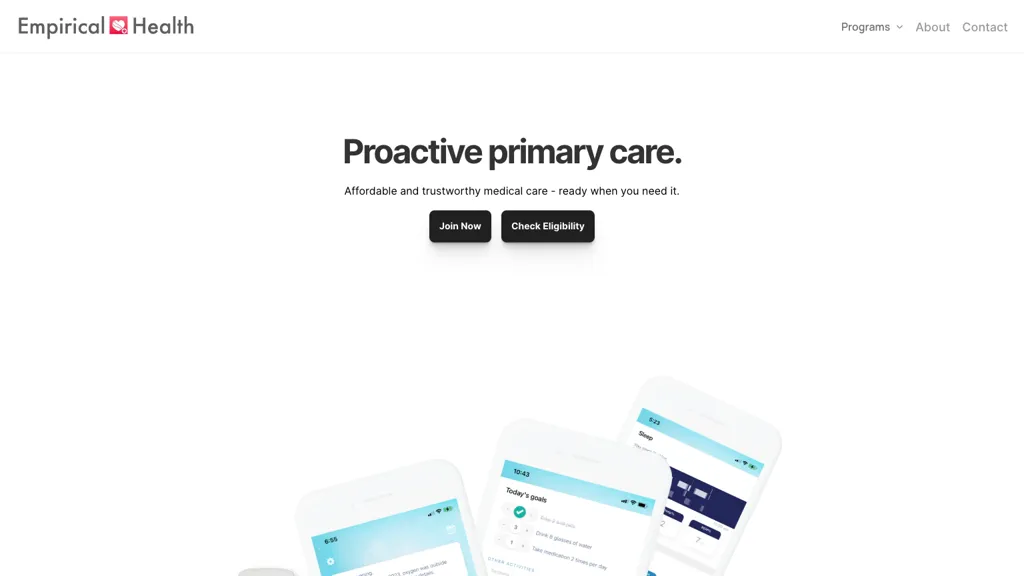What is Empirical Health?
Empirical Health provides proactive, affordable, and reliable primary care. The solution is created for consumers who want to realize a healthier tomorrow. Empirical Health leverages the power of consumer wearables, each equipped with the critical major vital health sensors, to monitor the major organ systems in a continuous fashion. This approach involves device integration so that doctors can adequately utilize the data of a consumer toward more customized and effective form of care.
Via the Empirical Health mobile application, patients are allowed to chat with physicians on resolving any medical questions, interpreting any health data, and overall helping them in the better management of their chronic diseases. The friendly, easy-to-use design allows it to be as easy as chatting with friends to conduct any video chat communications. To add on, this ability can be taken a notch higher in personalization, even with referrals, with the care plans on lab tests and prescriptions. With major insurance providers backing this across 20 US states, Empirical Health is able to deliver easy access to care without ever compromising on quality at very pocket-friendly subscription plans.
Key Features & Benefits of Empirical Health
Empirical Health offers a unique set of features and benefits that make it the number-one solution for many users. Among its key features are the following:
- Proactive primary care
- Consumer wearables for integrated health monitoring
- Consultation with doctors via mobile app
- Personalized treatment plans
- Most major insurance providers accepted
These features translate into a number of associated benefits: Early detection of health issues, personalized treatment plans and much improved care for chronic conditions. The integration with the consumer wearables provides an ease to be in step with their health and thus lets doctors make a better decision.
Use Cases and Applications | Empirical Health
Empirical Health’s AI can ingest data from consumer wearables and give personalized health advice; hence, it makes healthcare both proactive and resultantly in early detection. A few examples follow:
- Informed consultations for doctors after such review and interpretation of health data from wearables hence provide patients with more informed medical consultations and tailored care.
- It aids in the management of chronic conditions through tracking and analysis of health information overtime to allow early interventions that could ensure better outcomes generally in health. Businesses and sectors that Empirical Health can help include healthcare providers, insurance companies, and wellness programs. Critical success stories usually entail improved lives of users who have managed their chronic conditions very effectively through the platform.
How to Use Empirical Health
The use of Empirical is very user-friendly. Here is how one uses the application in a step-by-step approach:
- Download the Empirical Health App from the App Store.
- As you sign up, add in your health insurance information to check on its eligibility.
- Connect your consumer wearable devices to the app.
- Book an appointment and consult with a doctor via the inbuilt video chat amenity.
- Now, with your doctor’s designed care plan in place, proceed with the same, which might include lab tests, prescriptions, and even referrals.
- Ensure synchronized wearables to the app at all times for experience and regular appointments with your health provider through the platform.
How Empirical Health Works
Empirical Health enables next-generation AI algorithms to analyze data captured from consumer wearable devices, including vital signs and other continuous health metrics. The information is processed by the AI tool to come up with real-time health insights and recommendations.
This is entailed with data collection from the wearables, analysis by the AI system, and then reports presented both to the user and the doctor. Such continuous looping makes sure that any emerging health complication is noted early enough for timely intervention and management.
Pros and Cons of Empirical Health
As with any service, Empirical Health has its pros and cons. Here are some:
Pros
- Proactive and preventive health care
- Integrated consumer wearables for continuous monitoring
- Mobile-friendly app for consultation on-the-go
- Personalized care plans for each individual’s needs
- All major insurance providers are accepted.
Cons
- It is only available in 20 US states.
- Wearables are required for collecting health data.
- Health data could be subject to a possible privacy breach.
The user reviews have been commendable, by and large. Most of them said how this service had been very convenient and effective on their part.
Conclusion about Empirical Health
Empirical Health has immense potential as an innovation of proactive primary care, bringing together AI, consumer wearables, and high-quality personalized care. From the very user-friendly app, with its integration into major insurance providers, to a focus on prevention, it becomes a valuable tool for health-aware people, those who have chronic diseases, and busy professionals. Provided all these features continue to be upgraded in terms of further development and updating, it would make it an even more indispensable tool in modern health care.
Empirical Health FAQs
Frequently asked questions
Q: Is Empirical Health available in my state?
A: Currently, Empirical Health is available in 20 US states. Check their website for the most current list of supported states.
Q: Do I need to have any specific wearable to use Empirical Health?
A: Empirical Health is compatible with most of the consumer wearables. Just make sure to check if your device is compatible through the compatibility list on the app.
Q: How does safety relate to my health data?
A: Empirical Health has very tight security measures on your health data, but be very sure always to read through their privacy policy—good stuff to know how your information is used.
Q: Can I have access to Empirical Health even without insurance?
A: Yes, Empirical Health has subscription plans that do not need insurance. In some cases, insurance is a requirement in order to leverage other benefits.










